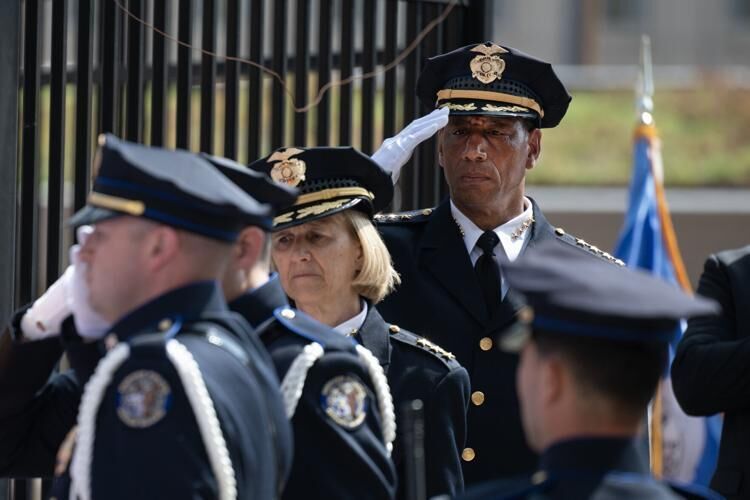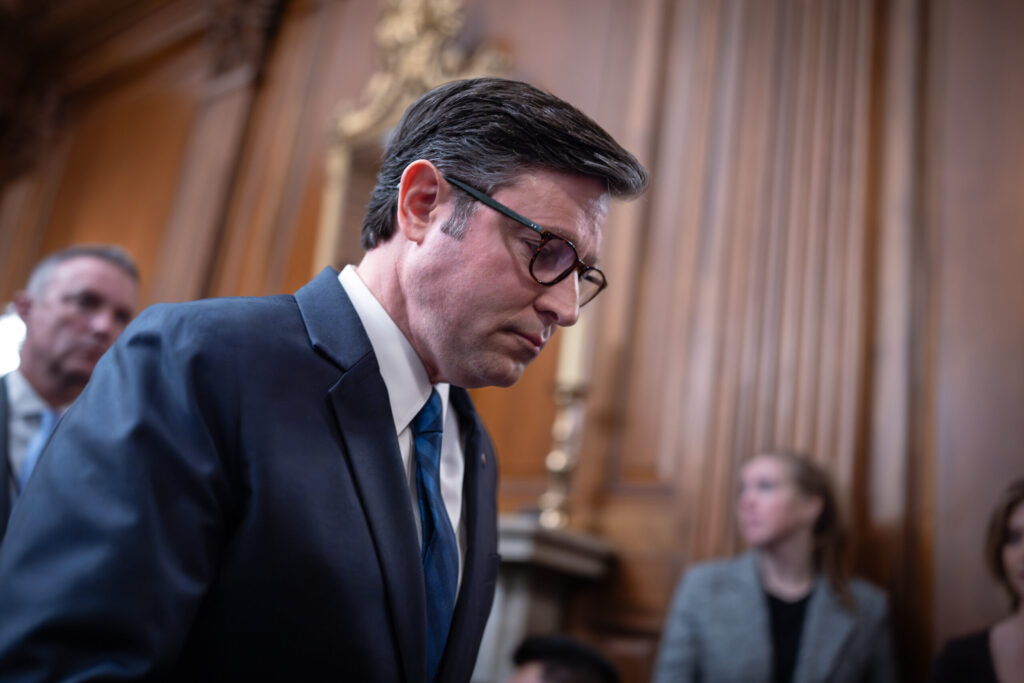Q&A with Sen. Mark Baisley | Senator on building coalitions while voting contrarian

When the Colorado legislature passes a new law, chances are Sen. Mark Baisley voted against it.
The Woodland Park Republican was the state Senate’s designated contrarian during the 2023 legislative session, voting against more than half of the bills that became law and being the only “no” vote on a dozen different bills.
But that didn’t stop Baisley from passing his own legislation, making 2023 his most successful session to date. Even as Republicans faced a near unprecedented 69-31 party disadvantage this year, Baisley pushed 14 of his 18 prime-sponsored bills across the finish line – including some legislation years in the making.
Voters elected Baisley to the state House in 2018, representing House District 39. After two terms, he made the leap to the higher chamber, being elected to represent Senate District 4 in November. Before running for office, Baisley served as vice chair of the Colorado Republican Party.
With his latest session concluded, Baisley sat down with Colorado Politics to discuss the year behind, the year ahead and his approach to legislating.
Colorado Politics: This was your first session in the Senate after serving in the House for four years. How are things different between the two chambers?
Sen. Mark Baisley: It is more relaxed. The House is raucous and it’s a bit of a brawl. … On the Senate side, when we in the minority decide to go toe-to-toe with the majority on a particularly egregious bill, our leadership will be ready with some compromise offerings. In the House, you fight over that until all hours of the night. In the Senate, once the majority sees that we’re going to be putting up a fight, their leadership will approach our leadership and say, “What is it that you guys need for us to go home at a decent hour and not filibuster all night?” They negotiate that quietly and once they come to an agreement, our leadership will pull us over and say: “Here’s the deal on the table. Are you guys good with this?” It’s just a lot less emotional, there’s more decorum.
CP: Do you prefer the calmness of the Senate?
Baisley: You know, I actually miss the brawl. I miss the knock-down, drag-out fight. However, now I’m well into my 60s. (Senate) Minority Leader Paul Lundeen told me a year ago, he said: “You’ll be better suited for the Senate.” And I think he’s right. I do feel like I’m better suited in the Senate.
CP: In your first Senate session, it seems you’ve already developed a reputation as a contrarian. You were the sole “no” vote on 12 separate bills in the Senate – more than any other lawmaker – and you voted “no” on 55% of bills that became law, which was the second-most of any senator. What’s your decision making process when it comes to voting on legislation?
Baisley: There’s five questions that I ask about every bill. First, is it constitutional, or would voting for a bill respect our oath of office to uphold the Constitution of the United States and the Constitution of the state of Colorado? Second, does it comport with American founding principles of life, liberty, pursuit of happiness and in God we trust? Third, how would wisdom prioritize a conflict of rights, if a bill would advance the rights of one group of people while stepping on or interfering with the rights of another group of people? Fourth, does this rise to the level of becoming state statute? The last question I ask is, what do my constituents want? If a bill doesn’t pass all of those questions, I vote “no.”
CP: Does voting against so many bills ever make things difficult between you and your colleagues?
Baisley: Oh, there’s some teasing. But I don’t think it strains the relationship any more than what you would anticipate. There are times when, especially if I’m voting against a bill that is sponsored by a fellow Republican, I will go talk to them and say: “Hey, sorry, but your bill does such and such in conflict with one of my principles, so I’ll be voting against it.” I’ve had objections from friends that I sit right next to. But those are not personal decisions, those are decisions on principle. And I’m pretty predictable, I think, because I’m very open with the principles that I use to make the decision. … There’s a lot of respect that’s held between myself and the others on both sides of the aisle. We’re all representing our districts, but also trying to uphold the principles that were given to us by America’s founders.
CP: Your own bills were pretty successful this session. Last year, you passed the fifth-least number of bills of any lawmaker, at only four bills. But this session, you passed 14 bills – more than over half of your caucus, and even more than Senate President Steve Fenberg. What’s behind that change?
Baisley: Maybe President Fenberg will come take a lesson from me. No, I’m just joking. When I look back at this session, I’m frankly surprised at just how successful I was able to be. On the other hand, I also received my first and my second veto from the governor. But I don’t know, I’d like to think maybe I’m getting better at the job. … Perhaps I’m getting the payoff of working respectfully with my friends on the other side of the aisle. I’m building on relationships that I made while in the House over the past four years.
I’ve also learned to work with county commissioners. After expanding my representation from two counties to eight counties going from the House to the Senate, I started to visit county commissioners in the counties I had not represented before. County commissioners really have their finger on the pulse of their community, so I asked them: “What can I do statutorily that would be of use to your county?” Several of my bills came from county commissioners. One, Senate Bill 108, tells taxing authorities that just because the property valuation went up by 40%, doesn’t mean you need to increase your taxation by 40%. You can increase it by 4% and account for inflation, but not shock constituents with an enormous tax bill. … It received unanimous votes every step along the way. They gave me several great ideas like that one.

CP: As you mentioned, you had the first vetoes of your legislative career this session. Two of your big bills, consumer protections in ticketing and extension of credit for gaming. What are your thoughts on those vetoes?
Baisley: I scratch my head about the line of credit for gaming. That bill was a request from the industry that I partially represent. I have Cripple Creek in my district and, along with Central City and Blackhawk, they asked to treat the high rollers in Colorado like they treat them in Las Vegas. … The concern was, would extending lines of credit for gaming get someone in trouble who has an addiction problem? I wanted a minimum amount that would set the bar a little high, so these lines of credit would only be extended to the high rollers. The bar was not set as high as I was thinking it should be, but we negotiated that with a lot of people. The governor, in the end, he thought the bar should be set a lot higher also, to the point where he vetoed it. … I understand it, but I think it was not a great decision.
The ticketing issue was quite different. We’re trying to keep the cost of tickets down to the level that the performers would like it to be, so their fans can afford to attend their performances. Middlemen get in there and scoop up the tickets with bot purchases … buying the maximum number they can buy, and then they resell for enormously jacked-up prices. We’re trying to get it back to where the average Joe can attend a concert or a football game and so on. But there was a lot of lobbying, a lot of industry pressure that came down. They visited me three times, those lobbyists, to try to talk me out of (the bill) or try to make adjustments. I’m certain they visited the governor. I’m not sure what kind of pressure was brought to him, but I was very disappointed that the bill did not go through. But he said that he would sign it if we make an adjustment, so we do intend to bring that bill up again next year.
CP: In addition to bringing back the ticketing bill, are there any other issues you want to tackle next session?
Baisley: There is one bill that was a terrific disappointment for me that I plan to bring back next year with some lessons under my belt. That is the Colorado Recreational Use Statute. There are, I believe, 56 14,000-foot peaks in Colorado and they’re not all accessible now. The Colorado Recreational Use Statute has been in place for decades to protect the liability of property owners who allow access across their property to get to those peaks and to get to camping areas and fishing areas and so on. They allow people to come across their property free of charge to access these areas, and they just ask that they not be sued if someone falls down, breaks a leg, and that sort of thing. A couple of years ago, someone did successfully sue for $7 million. That closed a lot of access by property owners. So we ran a bill this year that failed in committee. … We’re going to come back, we’ve gained a lot more momentum.
CP: Looking back from the interim, how would you describe the 2023 session overall?
Baisley: Surprising that it was not bloodier. We suffered some terrible losses, but I thought it would be worse, frankly. We stopped several bills, and we even improved some bills that I never thought we would because we’re in such a minority position. We got some really healthy compromises. For example, Sen. Jim Smallwood, a fellow Republican, convinced the Democrats to make a very significant change that we never thought they would. There was a bill to put psychologists in K-12 to assess students and, initially, they had in there that students could agree to the assessment without permission of the parents. … The sponsors agreed to take that out and it was a big moment because they did not have to. We had some really good moments in there that I appreciate.
CP: Building on that, what was your proudest moment from the session, and what was your biggest disappointment?
Baisley: I’ll give you two proudest moments. One, passing the semiconductor bill, which will help bring technology manufacturing not just back into the U.S., but to Colorado. $5.5 billion worth of semiconductor manufacturing funding from the federal government into Colorado. That was a big moment for companies that are taking advantage of it right now. I hear from them almost every day. Two, the biggest and most surprising moment was kind of a minor bill. It was a license plate bill that got killed in the House last year, but ultimately passed and was signed into law this year. That’s for “In God We Trust” to be an option on license plates in Colorado. It was put to death multiple times and revived multiple times. … I had several Democrats, even Democrats who initially opposed it, who were fighting to take credit for passing it in the end. That was an amazing moment for me and really the one that moved me the most.
The most disappointing moment for me was a bill introduced with just three days left in the session. It’s a conniving, underhanded bill that tells the public if they vote for a ballot measure in November, it will make sure everybody receives the same dollar amount in a Taxpayer’s Bill of Rights refund next year. Even if you didn’t pay any taxes, you still get a refund, same refund as a someone who paid a whole lot of taxes. But this will only go into effect if you also pass Proposition HH, which will ultimately do away with all Taxpayer’s Bill of Rights refunds. It is a sneaky, underhanded way to get rid of TABOR by dangling some dollars in front of people who have not earned those dollars. The defense of something that is, I think, ethically challenging by my fellow legislators was a real disappointment.
CP: What lessons did you learn from the year and what, if anything, will you do differently next session?
Baisley: I learned, no matter how effectively I deliver an argument on the Senate floor, I am not going to persuade votes from the other side of the aisle. My words are not going to help there. So, instead of talking to my fellow senators, I began talking to the camera, to my constituents. … I plan to talk to constituents through the cameras on the Senate floor a whole lot more often. I’m going to explain the context for bills, explain why it’s good or bad for America and for Colorado, and why I am voting and debating in the way that I am.
It’s a real honor to be elected to this position, to represent the folks of Senate District 4. I’m doing my best to represent them within the context of what government ought to be doing, and more importantly, what government ought to not be doing. So, I’ll continue operating as I have.














